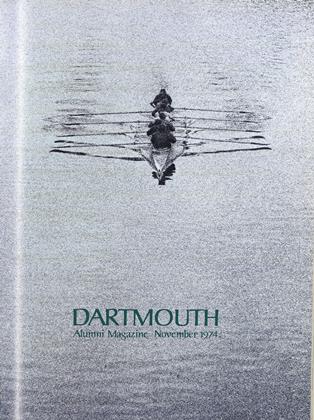NATURAL PHILOSOPHY AT DARTMOUTH: FROM SURVEYORS' CHAINS TO THE PRESSURE OF LIGHT.
November 1974 ALLEN LEWIS KINGNATURAL PHILOSOPHY AT DARTMOUTH: FROM SURVEYORS' CHAINS TO THE PRESSURE OF LIGHT. ALLEN LEWIS KING November 1974
By Sanborn C. Brown '35 andLeonard M. Rieser '44 (Vice President of theCollege, Dean of the Faculty of Arts andSciences, and Professor of Physics). Hanover:University Press of New England. 127 pp.With 25 illustrations. $6.50
At first the primary aim of the curriculum at Dartmouth College was not so much to fit "the elite of the land to become intellectual leaders of society" as to train young men to become missionaries and preachers, albeit often they became intellectual leaders in their communities. They were expected not only to master thoroughly the classical languages and the Bible, and for practical purposes to learn the arts of good writing, fine speaking, accurate mensuration and surveying, but also to acquire a firm knowledge of the natural and moral laws that govern God's world and man's dominion therein. Subjects of a scientific nature therefore were studied in a course on Natural Philosophy. By the end of the 18th century, however, the aim of the curriculum had been broadened to include preparation for medicine and the law, and natural philosophy had become restricted primarily to topics in physics and astronomy.
In this little book Brown, who is Professor of Physics at M.I.T., and Rieser trace the growth of the Departments of Physics and Astronomy on the Dartmouth campus during the 18th and 19th centuries through the interests, capabilities, strengths, and weaknesses of the professors who occupied the chairs in these fields. They describe especially how the initial purely teaching function of these men developed into a healthy combination of teaching and research. Their treatment is not exhaustive but it is sufficient to show how "the whole approach to physics as an intellectual discipline and its interaction with society has changed profoundly in the last 200 years."
In spite of its brevity, Natural Philosophy atDartmouth is a good introduction to the history of physics and astronomy at Dartmouth College. It is not only a fine addition to the College publications that many alumni and friends should appreciate, but also from a broader viewpoint it is a well-written account of how the growth of scientific research affected teaching in physics and astronomy at a small liberal arts college.
Dartmouth Professor of Physics, Mr.Kingteaches courses in Optics and Thermodynamics.
 View Full Issue
View Full Issue
More From This Issue
-
 Feature
FeatureDartmouth De Gustibus: Food for Thought
November 1974 By MICHAEL STUART -
 Feature
FeatureThe Great Rip-off
November 1974 By V.F.Z. -
 Feature
FeatureYou Can Go Home Again
November 1974 By DICK REDINGTON '64 -
 Feature
Feature"ring O bells!"
November 1974 By ELIZABETH F. MOORE -
 Article
ArticleBig Green Teams
November 1974 By JACK DtGANGE -
 Article
ArticleFurther Mention
November 1974 By J.H.
Books
-
 Books
BooksAlumni Articles
APRIL 1966 -
 Books
BooksShelf Life
July/August 2001 -
 Books
BooksELEMENTS OF BUSINESS LOGISTICS.
JUNE 1965 By DANIEL MARX JR. '29 -
 Books
BooksTHE MOLLY MAGUIRES.
DECEMBER 1964 By EDWARD C. KIRKLAND '16 -
 Books
BooksKostechev's Plant Respiration. Translated and Edited
DECEMBER 1927 By George M. Robertson -
 Books
BooksINTERNAL STRUCTURE OF GRANITIC PEGMATITES.
December 1949 By Richard E. Stoiber '32

